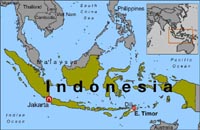Bird flu experts in Indonesia discussing strategy to fight disease
Scientists from the World Health Organization, the U.N. Food and Animal Organization and the U.S. Centers for Disease Control and Prevention, among others, will work with government officials to try to map out a plan to get a handle on the H5N1 virus.

The meeting comes a month after Indonesia grappled with the world's largest reported family cluster. Six of seven family members from a remote farming village on Sumatra island died after testing positive for the bird flu virus. An eighth relative was buried before samples could be taken, but WHO considers her part of the cluster.
Scientists have not been able to link the infected relatives to contact with sick birds and believe limited human-to-human transmission may have occurred. However, the virus has not mutated and no one outside the family has fallen ill.
Experts fear the current bird flu virus will mutate into a form that is highly contagious among humans, potentially sparking a pandemic. So far, most human cases have been traced to contact with infected birds. At least 129 people have died worldwide since the virus began ravaging Asian poultry in late 2003, 38 of them in Indonesia, according to the AP.
The country is on the fast track to becoming the world's hardest hit, trailing only Vietnam where 42 people have died.
Subscribe to Pravda.Ru Telegram channel, Facebook, RSS!





